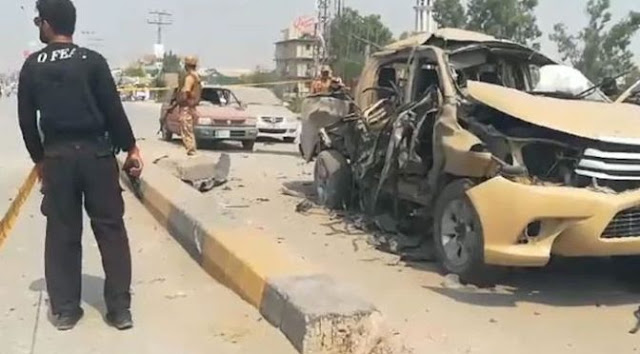Peshawar Bomb Blast: A Dark Day for Peace and Security
Peshawar, a city that has seen its fair share of tragedy and resilience, was once again rocked by a bomb blast today. The incident serves as a grim reminder of the ongoing challenges to peace and security in the region. This article aims to provide an overview of the events surrounding the bomb blast, its implications, and the need for collective efforts to ensure a safer future.
The Bomb Blast:
The bomb blast occurred earlier today in a crowded marketplace in the heart of Peshawar. The explosion was powerful, resulting in significant damage to nearby buildings and causing a large number of casualties. Emergency services rushed to the scene, and the injured were immediately transported to nearby hospitals. As of the time of writing, the death toll continues to rise, and many are still in critical condition.
The Implications:
This tragic incident has far-reaching implications on multiple fronts:
1. Loss of Lives: The most immediate and heart-wrenching consequence is the loss of innocent lives. Families have been shattered, and the community is left in mourning.
2. Security Concerns: Peshawar has been a hotbed of terrorist activities in the past, and this incident raises concerns about the ongoing security situation in the region. Authorities are now tasked with investigating the blast and ensuring the safety of the city's residents.
3. Psychological Impact: Such incidents can have a profound psychological impact on the affected individuals and the wider community. People may feel anxious, traumatized, and insecure in the aftermath of such violence.
4. Economic Fallout: Bomb blasts and other acts of terrorism can have a detrimental effect on the local economy. Businesses may suffer, and investors may be deterred, leading to economic instability in the region.
5. Political Ramifications: Acts of terrorism often have political undertones, and this incident may influence the political landscape of the region. Leaders and policymakers must respond effectively to maintain stability.
The Need for Collective Efforts:
In the face of such devastating events, it becomes crucial for society, government, and international bodies to come together and take collective action:
1.Enhanced Security Measures: Authorities must intensify efforts to bolster security in vulnerable areas. This includes increasing the presence of law enforcement agencies, implementing stricter surveillance measures, and improving intelligence-sharing among security forces.
2. Community Engagement: It is essential to involve local communities in the fight against terrorism. Communities can play a pivotal role in identifying and reporting suspicious activities, fostering a sense of ownership over security.
3.International Cooperation: Terrorism knows no borders, and international cooperation is vital in combating this global threat. Pakistan must collaborate with neighboring countries and international partners to dismantle terrorist networks.
4.Social and Economic Development: Addressing the root causes of extremism, such as poverty and lack of education, is crucial. Investment in social and economic development can help alleviate the conditions that breed radicalization.
5.Political Stability: Political stability and effective governance are essential to counter terrorism. Political leaders must work towards building a more stable and secure environment for their citizens.
Conclusion
The bomb blast in Peshawar is a stark reminder of the persistent threat of terrorism in the region. It is a tragedy that has claimed innocent lives, disrupted communities, and raised serious security concerns. To prevent such incidents in the future, it is imperative for society, government, and the international community to work together to address the root causes of extremism, strengthen security measures, and promote peace and stability in the region. Only through collective efforts can we hope to create a safer and more secure future for the people of Peshawar and beyond.



Comments
Post a Comment